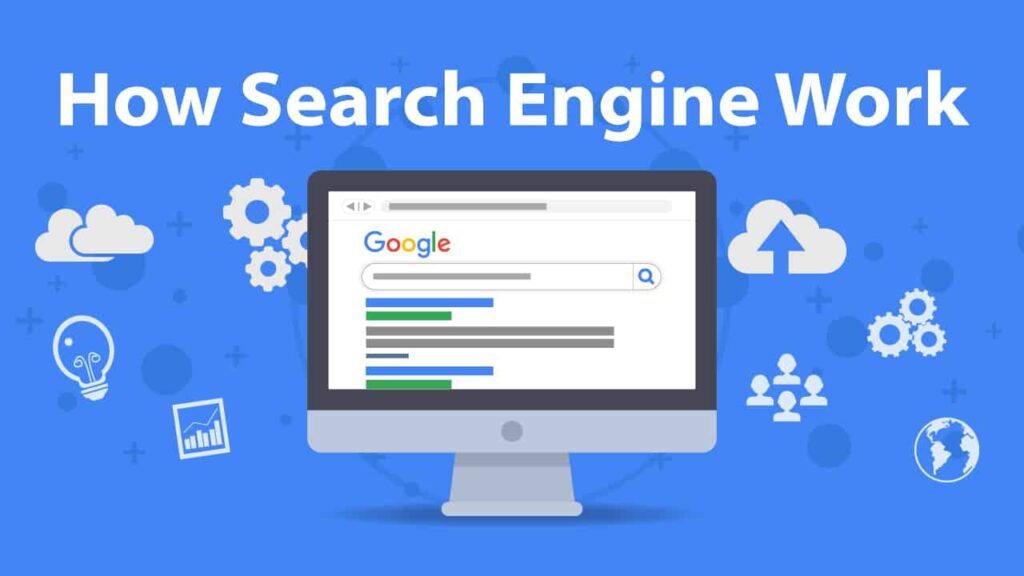
Search engines have two main functions: to index sites and give users answers to queries
In this article, we will tell you how search engine placement and search robots work – how they index sites and provide answers – and how to increase the site’s ranking. How Google and other search engines work search engines respond to queries
How do search engines determine the relevance of text and popularity? How to get better search engine positioning?
How search engine site index
Think of the world wide web as a network of stops in a huge subway. Each stop is a unique document. This is usually a web page, but sometimes it is a PDF, JPG, or another file. Search engines need a way to scour the entire city and find all the stops along the way. To do this, they use the most accessible route – links. The link structure on the web connects all pages. Links help search engine crawlers crawl billions of linked documents on the web.
Once search engines find these pages, they decode their code and store selected samples in huge databases. Search engines pull them out of there when a search query requires it. To store billions of pages and display them on demand in a split second, search engine placement companies have built data centers around the world. — How search engines respond to queries.

Search engines are machines that give answers. When a person searches for something online, the robot crawls its array of billions of documents and:
- returns only those results that answer the user’s request;
- ranks them according to popular sites that serve this information.
How search engines determine relevance and popularity
For a search engine, relevance is more than just finding a page with certain keywords. In the early days of the web, search engines did not go beyond this simplistic step, and search results were not very valuable. Over the years, engineers have developed better ways to correlate results with user requests. Today there are hundreds of factors affecting relevance. Next – about the most important of them.
Search engines usually assume that the more popular a site, page, or document, the more valuable the information in it. Popularity and relevance are not defined manually. Search engines use algorithms to first sort results by relevance and then rank them by quality or popularity.
These algorithms often include hundreds of variables. In search engine marketing, these are called ranking factors. Moz even created a dedicated resource on this topic – Search Engine Ranking Factors. Here you can read about the results of a survey of experts on the influence of different ranking factors.

How to get a higher ranking in the search engine
Complex algorithms of search engines can seem like a dense forest. Search engines don’t talk about how to get better results or get more traffic. But they do provide a set of rules for SEO hacks optimization.
SEO Guidelines From Google Webmasters:
- create pages for users, not search engines. Don’t fool users. Don’t serve one content to search engines and the other to users.
- create a site with a clear hierarchy and text links. Each page must be accessible from at least one static text link.
Build a useful site rich in information. Write texts for pages that clearly and clearly describe your content. Make sure title elements and ALT attributes are accurate and describe the content.
Use keywords to create descriptive, human-readable links. Provide one link version and use 301 redirects or rel = “canonical” for duplicate content. Alternatively, check out Google’s SEO hacks Starter Guide.

Experimenting
To understand how search engines rank sites, webmasters are experimenting. In the process, you can understand how search engines rank sites.
Some of the experiments that the Moz webmasters have done followed this pattern:
- Register a new site with meaningless keywords.
- Create many pages on the site. All of them were built around one key term – also meaningless.
- Make the pages almost the same. Then change one variable in them – for example, the position of the text, formatting, keywords, and link structure.
- Link to the created domain from indexed pages on other domains.
- Note for yourself the position number of pages in search engines.
- Make small changes to pages and evaluate their impact on search results. This is to understand what factors can increase or decrease the rating.
- Record any significant results and retest them on different domains or with different keys.
If multiple tests consistently return the same results, you may have discovered the schema that search engines are using. Testing is helpful. But that’s not the only thing that can be done to understand how search engines work. You can understand more by reading patent applications from search engines in the US Patent Office. You can also find out more information about how search engines work.
The most famous patent application is the site PageRank. Thanks to her, Google became popular in the late ’90s. PageRank is a link ranking algorithm. It assigns a numerical value to each web page. It measures the “importance” or “authority” of a page among the rest. More on PageRank
Using testing techniques and knowledge from patent applications, SEO professional services have come to understand many of the basic operations of search engines and the basic components of sites and pages that generate ranking and traffic.
You also can learn how behavioral factors affect site ranking and site index.






